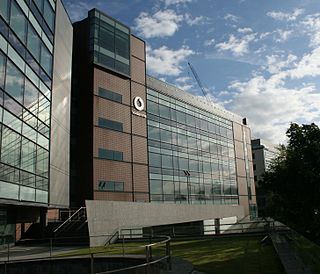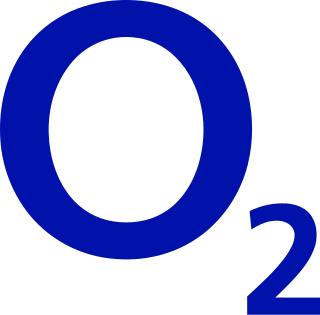Telecommunications in Ireland operate in a regulated competitive market that provides customers with a wide array of advanced digital services. This article explores Ireland's telecommunications infrastructure including: fixed and mobile networks, The voice, data and Internet services, cable television, developments in next-generation networks and broadcast networks for radio and television.

Orange S.A. is a French multinational telecommunications company. It has 266 million customers worldwide and employs about 89,000 people or more in France and 59,000 people worldwide. In 2023, the group had a revenue of approximately €43 billion. The company's head office is located in Issy-les-Moulineaux, in the southwestern suburban area of Paris City.
Television in the Republic of Ireland is available through a variety of platforms. The digital terrestrial television service is known as Saorview and is the primary source of broadcast television since analogue transmissions ended on 24 October 2012. Digital satellite and digital cable are also widely used.

Eircom Limited, trading as Eir, is a large fixed, mobile and broadband telecommunications company in Ireland. The company, which is currently incorporated in Jersey, traces its origins to the Ireland's former state-owned monopoly telecommunication provider Telecom Éireann and its predecessors, P&T and before the foundation of the state, the telecommunications division of the GPO. It remains the largest telecommunications operator in Ireland and has overseas operations focused on the business and corporate telecom markets in the United Kingdom. The company was in majority state ownership until 1999, when it was privatised through a floatation on the Irish and New York Stock Exchanges.

Vodafone Group Plc is a British multinational telecommunications company. Its registered office and global headquarters are in Newbury, Berkshire, England. It predominantly operates services in Asia, Africa, Europe, and Oceania.
O2 (typeset as O2) is a global brand name owned by the Spanish telecommunications company Telefónica. The company uses the O2 brand for its subsidiaries in the United Kingdom and Germany. Since 2018, it is also used as an online-only flanker brand in Spain.
Meteor Mobile Communications Limited was a GSM and UMTS mobile telecommunications company in Ireland. They operated a GSM/GPRS/EDGE/UMTS(HSPA+) and LTE cellular communications network under licence from the Commission for Communications Regulation (ComReg), and were the third entrant in the market, after Vodafone Ireland and Three Ireland. The company was a wholly owned subsidiary of Irish telecoms network Eir, having been purchased for €420m in 2005. Meteor was the only Irish owned mobile operator in Ireland. Meteor once issued new numbers with the prefix code 085. Since the introduction of full mobile number portability in Ireland, access codes have become less relevant as mobile telephone users may now retain their mobile telephone numbers when moving between mobile network operators. As a result, Meteor customers could have numbers starting with the codes 083, 085, 086, 087, or 089.

Vodafone Ireland Limited, a wholly owned subsidiary of Vodafone Group, is a mobile phone network, broadband and TV provider in Ireland. It was created when the Vodafone Group bought Eircell, the mobile arm of Telecom Éireann. As of September 2019, Vodafone has 26% of broadband subscribers, and 43% of mobile phone subscribers.

Telefónica Ireland was a broadband and telecommunications provider in Ireland that traded under the O2 brand (typeset as O2). O2 Ireland was previously called Esat Digifone when it was owned by Esat Telecommunications (and Telenor) from 1997 to 2006.

BT Communications (Ireland) Limited is a telecommunications and internet company in Ireland. It is a subsidiary of BT Group plc.

Tele2 AB is a provider of mobile and fixed connectivity, telephony, data network services, TV, streaming and global Internet of Things services, amongst others, to consumers and enterprises. It is headquartered in Kista Science City, Stockholm, Sweden. It is a major mobile network operator in Sweden, Estonia, Latvia and Lithuania. The company initially founded Tele2 Russia, but later sold all its operations, only leasing the use of its brand name.

M1 Limited is a telecommunications company based in Singapore. Founded in 1994, M1 was listed on the Singapore Exchange from 2002 to 2019. The company is a subsidiary of Keppel Ltd.

Mobilink was the trade name of Pakistan Mobile Communications Limited (PMCL), a mobile operator in Pakistan providing a range of prepaid and postpaid voice and data telecommunication services to both individual and corporate subscribers. In 2017, Warid Pakistan merged with Mobilink to form Jazz, under which the company now operates. Mobilink's head office was in Islamabad, and its last president and CEO was Aamir Ibrahim, who became the CEO of Jazz.
Yettel Serbia is a Serbian mobile, fixed, internet and IPTV provider, owned by the Czech investment group PPF. It is headquartered in Belgrade. As of 2020, it is the second largest mobile telephony operator with market share of 36.98%.
ONO was a Spanish broadband communication and entertainment company, delivering integrated telephone, television and Internet services to its residential customers. In this segment, it has 3.7 million services contracted and over six million users.
Manx Telecom Ltd. is the primary provider of broadband and telecommunications on the Isle of Man. It is owned by Basalt Infrastructure Partners LLP.

MEO is a mobile and fixed telecommunications service and brand from Altice Portugal, managed by MEO - Serviços de Comunicações e Multimédia. The service was piloted in Lisbon in 2007 and was later extended to Porto and Castelo Branco.
TalkTalk Telecom Group Limited is a British telecommunications company that provides pay television and Internet access services to businesses and consumers in the United Kingdom. It was founded in 2003 as a subsidiary of Carphone Warehouse and was demerged as a standalone company in March 2010. Its headquarters are in Salford.
3G mobile telephony was relatively slow to be adopted globally. In some instances, 3G networks do not use the same radio frequencies as 2G so mobile operators must build entirely new networks and license entirely new frequencies, especially so to achieve high data transmission rates. Other delays were due to the expenses of upgrading transmission hardware, especially for UMTS, whose deployment required the replacement of most broadcast towers. Due to these issues and difficulties with deployment, many carriers delayed acquisition of these updated capabilities.

Airtel India is the second largest provider of mobile telephony and third largest provider of fixed telephony in India, and is also a provider of broadband and subscription television services. The brand is operated by several subsidiaries of Bharti Airtel, with Bharti Hexacom and Bharti Telemedia providing broadband fixed line services and Bharti Infratel providing telecom passive infrastructure service such as telecom equipment and telecom towers. Currently, Airtel provides 5G, 4G and 4G+ services all over India. Currently offered services include fixed-line broadband, and voice services depending upon the country of operation. Airtel had also rolled out its VoLTE technology across all Indian telecom circles.











